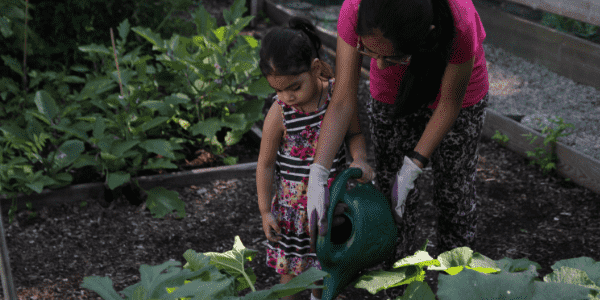Relationships between kids and seniors blossom in the garden at Kingsbridge Heights Community Center (KHCC).
The KHCC Intergenerational Program connects K-5 students in the Bronx with senior citizens from a local senior center so they can work, learn and share time together in the garden. It’s one of many community programs at KHCC, which currently serves around 4,500 families annually. More than 1,600 people visit per week for services and programs geared toward kids, teens, parents and families. The garden ties in with many of these programs, and the aim is to eventually have every KHCC visitor spend time in the garden in some capacity.
“We work with a low-income community and 76% of our participants live below the poverty line,” explains William Littleton, KHCC director of development and healthy communities. He has spent the last three years expanding the 10-year-old garden program, doubling the space to include a large park and community garden plots. “This new space is further supporting our goal to ensure the families in our community are active and healthy, and have a safe green environment to learn and to grow.”
“This new space is further supporting our goal to ensure the families in our community are active and healthy, and have a safe green environment to learn and to grow.”
The garden is integral to KHCC’s after-school and special needs youth programs. For individuals learning English, it serves as a familiar place to practice their new language. And the garden provides a healing outdoor space for the sexual and domestic abuse counseling program.
For many kids in the community, KHCC provides their only exposure to gardening. And for some of them, the intergenerational garden program is their only chance to experience a relationship with a grandparent-type figure.
“Quite often their grandparents have stayed back in their country of origin, so some of them really miss out on that grandparent experience,” Littleton explains.
During sessions in the garden, seniors and kids team up in small groups of two seniors per three to four kids. They may work with seeds, plant, harvest, look for worms, or learn about pollination or nutrition. Staff support at KHCC includes a nutrition and food access coordinator who helps to plan and organize the activities.
The program has been a win for everyone: the students, the seniors and the center.
“Bringing in senior citizens to connect with the kids helps to build community,” Littleton says. “It’s also a good way for us to build partnerships and foster a shared vision for what we want our community to look like. It’s a great thing to see the generations together in the garden — the warmth you see in the kids. You see the youthfulness come back to the seniors as they talk about when they were growing up and their experiences. It’s pretty special.”
Tips for Building a School-Based Intergenerational Program
- Invite grandparents in your school community to participate. Spread word through students and parents, publish information in the school newsletter, distribute flyers and posters, etc.
- Partner with a nearby senior center, retirement community, or other organization that aligns with your garden program goals. Ask the community partner to help with recruitment and promote the program to their residents/members.
- Assign a coordinator, perhaps a parent or teacher, to oversee the program, plan activities, and ensure the kids’ and seniors’ time in the garden is well structured and enjoyable for participants of all ages. (Neither kids nor seniors are likely to take on the project management or leadership of the program.)
- Find out what specific gardening skills and knowledge the seniors in your community bring to the table and organize activities around that.
- Start small and keep in mind that sometimes seniors are reluctant about new experiences or schedule changes. Tailor the experience to their needs as well as the students’ needs. Once you’ve established the connection and they enjoy themselves, they will naturally want to come back.
- Keep expectations for productivity minimal. This type of program is about connecting with others while enjoying time in the garden and learning. Some work will get accomplished, but schedule big maintenance projects some other time.



